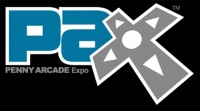
Game industry consultant Martin Stever sent us his observations of the first day of PAX, the Penny Arcade Expo, held in
PAX, the convention celebrating all things geek, opened Friday morning in downtown
Occasionally an MC addresses the crowd, but his words can’t be discerned because of the room’s poor acoustics combined with a sound system not up to the job. Nonetheless the crowd roars when free t-shirts are hurled into the crowd. No one is certain exactly what the shirts are for or what the art on them means, but they are free and they are black.
PAX has been called an accidental success. A few years ago it was in a hotel ballroom on
At the same time Ryan Dancey, CMO of CCP calls it, “Amazingly important, one of two tentpole consumer events in North America, after
The exhibitor booths have less of the opulence and conspicuous expense of the old CES or E3 shows; the booths here are on par with the big booths of San Diego Comic-Con. Along with the computer game companies are a handful of board and role playing companies: Flying Frog, Privateer Press, Wells Expeditions (with
The entire exhibit floor is small, perhaps 1/2 the square footage of Chicago Comicon, which means the floor is crowded. PAX is a rare convention: despite the fact that it’s new, disorganized, and the programming weak, it is sold out. There are no badges available at the door. There is no last minute booth availability. While the exhibit floor is packed, the events and open gaming rooms are near vacant.
The attendees of PAX range from those with rainbow hair (multi-pierced, tattooed, utility-kilted geeks who’ve just bussed down from the room over their parents’ garage, both belligerent and oblivious) to brilliant 13-year-old kids cutting class from Lakeside, Bill Gates’ alma mater, who just want to see the newest character models from World of Warcraft and score a free t-shirt. Only one in 20 is a woman. About one in 300 is costumed. One in two is wearing a black t-shirt featuring an inside geek culture joke.
I meet a pair of gamers who have flown to
Score between exhibitors is kept based on how many people can be attracted to jam the aisle looking at the newest trailer or big screen rendition of real time game playing. This morning Valve is winning. A couple of hundred people are spending over an hour in line to get five minutes time playing on Left 4 Dead 2. Big screens above each player duplicate the action on their computer monitor. The crowd roars its approval at a particularly grizzly finishing move, and laughs as zombie after zombie is killed. 2009 will be marked as an up year for zombie ganking.
Another booth focused on zombie killing, Flying Frog, has a line of people waiting to demo Last Night on Earth. The guys doing demos are not hoarse now, but they will be. This is a very LOUD exhibit hall, with game sounds blasting from a wide array of speaker systems.
Taken to an extreme, one booth has sound systems competing within the booth. Kids line up to take one of four stages to play Rock Band. The four stages point into the booth’s center. Walking through is a calamity of noise; somewhere George Harrison rolls over in his grave.
The best swag of the morning is The Art of Guild Wars 2. Arenanet has been working on Guild Wars 2 for over two years. With over 6 million units sold, second only to World of Warcraft, fans are excited and again lining up by the hundreds to get copies of the book. Daniel Dociu’s art is brilliant. The trailer and bits of art shown reflect a massive upgrade in the look of the game. Fans anxiously clump around Arenanet employees hoping for a scoop on both the release date and the changes in game play. The game will not be released until “it is ready.” The non-news is dutifully repeated by each company employee. The fans remain gathered, hoping for a slip.
Set 250 years after the events of Guild Wars, Guild Wars 2 appears to be the most highly-anticipated release of the show by existing fans. A novel by Matt Forbeck, which begins to fill in the storyline between the two games is due to be published in the spring, which may give a hint of the game’s release date. Forbeck is here for a number of events promoting the novel.
In many ways PAX has the feeling of a college football game. The people here express their distance from society by gathering with members of their tribe. So while the convention is loud, crowded, hot, disorganized, poorly programmed, and strangely staffed, everyone is having fun. Smiles are everywhere and above the din of computerized death matches, laughs permeate the air.


